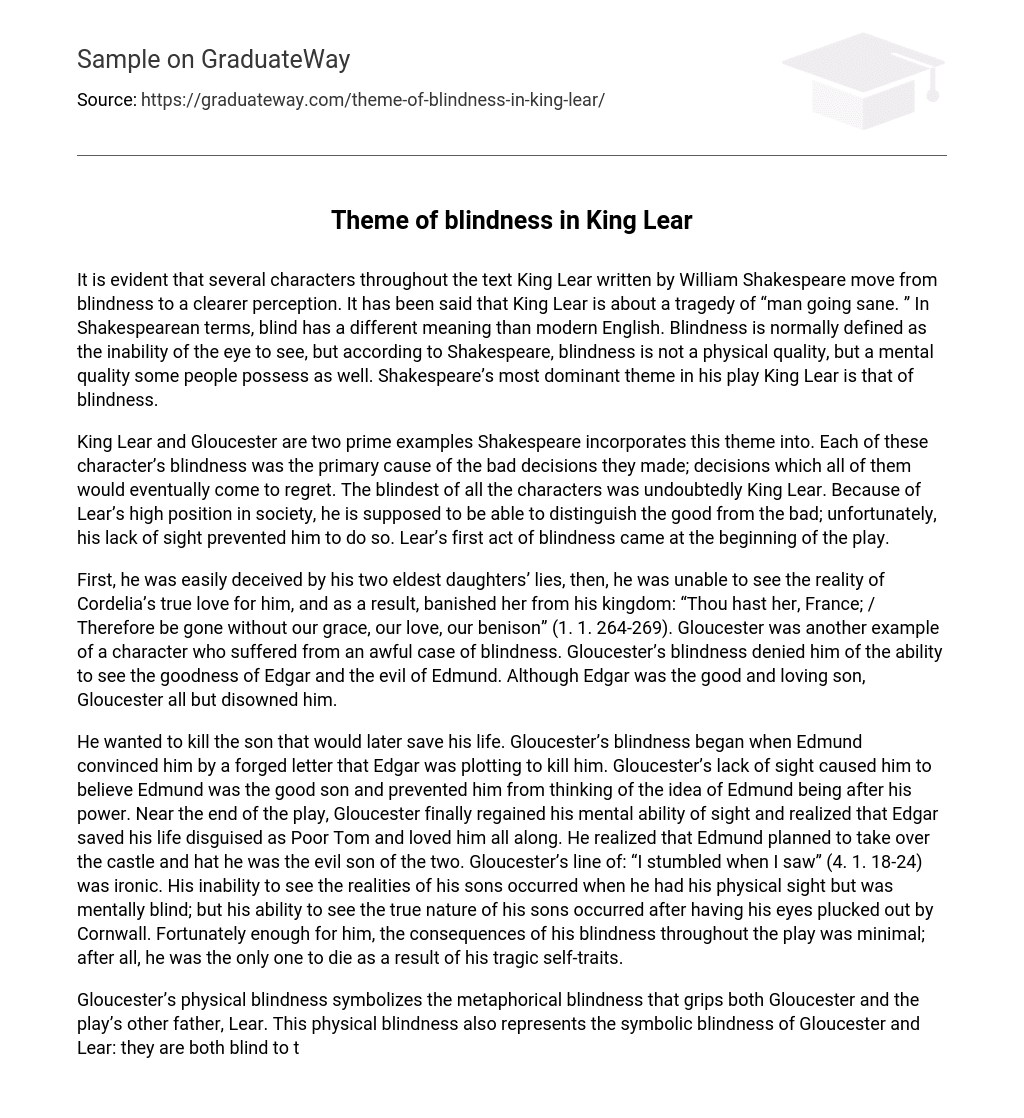It is evident that several characters throughout the text King Lear written by William Shakespeare move from blindness to a clearer perception. It has been said that King Lear is about a tragedy of “man going sane. ” In Shakespearean terms, blind has a different meaning than modern English. Blindness is normally defined as the inability of the eye to see, but according to Shakespeare, blindness is not a physical quality, but a mental quality some people possess as well. Shakespeare’s most dominant theme in his play King Lear is that of blindness.
King Lear and Gloucester are two prime examples Shakespeare incorporates this theme into. Each of these character’s blindness was the primary cause of the bad decisions they made; decisions which all of them would eventually come to regret. The blindest of all the characters was undoubtedly King Lear. Because of Lear’s high position in society, he is supposed to be able to distinguish the good from the bad; unfortunately, his lack of sight prevented him to do so. Lear’s first act of blindness came at the beginning of the play.
First, he was easily deceived by his two eldest daughters’ lies, then, he was unable to see the reality of Cordelia’s true love for him, and as a result, banished her from his kingdom: “Thou hast her, France; / Therefore be gone without our grace, our love, our benison” (1. 1. 264-269). Gloucester was another example of a character who suffered from an awful case of blindness. Gloucester’s blindness denied him of the ability to see the goodness of Edgar and the evil of Edmund. Although Edgar was the good and loving son, Gloucester all but disowned him.
He wanted to kill the son that would later save his life. Gloucester’s blindness began when Edmund convinced him by a forged letter that Edgar was plotting to kill him. Gloucester’s lack of sight caused him to believe Edmund was the good son and prevented him from thinking of the idea of Edmund being after his power. Near the end of the play, Gloucester finally regained his mental ability of sight and realized that Edgar saved his life disguised as Poor Tom and loved him all along. He realized that Edmund planned to take over the castle and hat he was the evil son of the two. Gloucester’s line of: “I stumbled when I saw” (4. 1. 18-24) was ironic. His inability to see the realities of his sons occurred when he had his physical sight but was mentally blind; but his ability to see the true nature of his sons occurred after having his eyes plucked out by Cornwall. Fortunately enough for him, the consequences of his blindness throughout the play was minimal; after all, he was the only one to die as a result of his tragic self-traits.
Gloucester’s physical blindness symbolizes the metaphorical blindness that grips both Gloucester and the play’s other father, Lear. This physical blindness also represents the symbolic blindness of Gloucester and Lear: they are both blind to the intentions of their children, wrongfully banishing the loyal one and rewarding the devious ones; (2) They are blind to their responsibilities; it is also clear that Lear was blind to the needs of his people during his sanity as evidenced by his regret over not taking care of the less fortunate.
The comparisons between the two men are clear: both have loyal children and disloyal children, both are blind to the truth, and both end up banishing the loyal children and making the wicked one’s their heir. Only when Gloucester has lost the use of his eyes and Lear has gone mad does each realize his big error. It is fitting that the play brings both of them together near Dover in Act 4 to re-emphasis about how their blindness to the truth about their children has cost them dearly. Downfall such as this is devastating for both Lear and Gloucester, and mental blindness is the cause of it.
As a result, they cannot blame that “man goes sane”, because the origin comes from themselves. Both father figures are really close as to what led them to see the truth. They began by betraying one of their kids, were blind to the truth, either mentally or physically and both developed a clearer perception when it was a little too late. It’s an impressive lesson for everyone living in this physical world that our eyes can only see the surface of objects and our hearts can see through the essential of objects.





